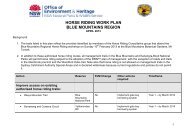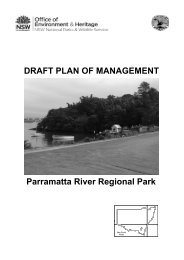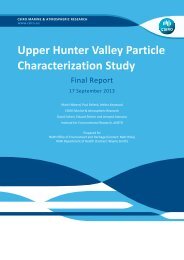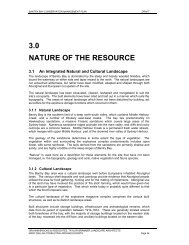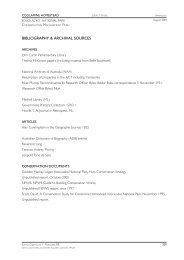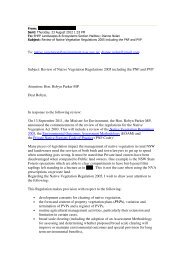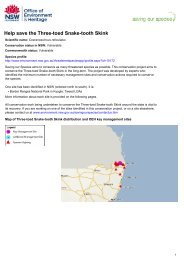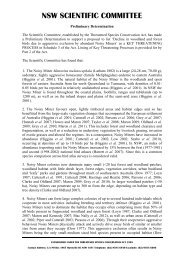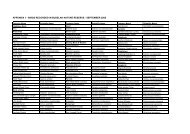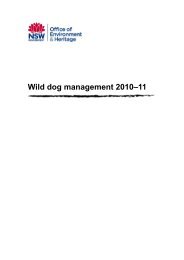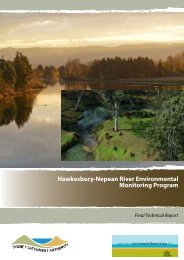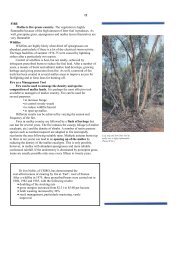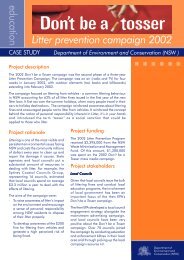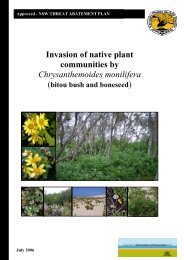Progress Report 2007-2008 - Department of Environment and ...
Progress Report 2007-2008 - Department of Environment and ...
Progress Report 2007-2008 - Department of Environment and ...
Create successful ePaper yourself
Turn your PDF publications into a flip-book with our unique Google optimized e-Paper software.
Five-year review <strong>of</strong> Crown reserves<br />
4<br />
The Memor<strong>and</strong>a <strong>of</strong> Underst<strong>and</strong>ing for both Crown reserves <strong>and</strong> State conservation areas (SCAs)<br />
contain provisions for five-yearly reviews. In the case <strong>of</strong> SCAs, the review is also a statutory<br />
requirement <strong>of</strong> the National Parks <strong>and</strong> Wildlife Act 1974 (clause 47M), requiring the Minister<br />
administering the Act to provide reasons why <strong>and</strong> SCA could not be reclassified as a national park or<br />
nature reserve.<br />
The first five-year review <strong>of</strong> SCAs was completed in <strong>2008</strong> <strong>and</strong> recommended reclassification <strong>of</strong> ten<br />
parcels <strong>of</strong> l<strong>and</strong>, including six SCAs as national park or nature reserve.<br />
Joint strategy to facilitate an employment <strong>and</strong> development program for<br />
Aboriginal people<br />
In <strong>2007</strong>–<strong>2008</strong>, 8% <strong>of</strong> the DECC workforce were Aboriginal people. This represents a total <strong>of</strong><br />
around 300 people. In <strong>2007</strong>–<strong>2008</strong>, 5% <strong>of</strong> the Forests NSW workforce were Aboriginal people.<br />
These figures are both above the NSW Government benchmark <strong>of</strong> 2% Indigenous employment.<br />
In <strong>2008</strong>, DECC established an additional seven Aboriginal cadetships, making a total <strong>of</strong> 17 in the<br />
agency. Through the Aboriginal cadetship program, cadets study full-time <strong>and</strong> have 12 weeks <strong>of</strong><br />
practical work experience each year to complete their undergraduate degree, with guaranteed<br />
employment on successful completion.<br />
Private native forestry<br />
Private native forestry is the sustainable logging <strong>of</strong> native vegetation on private property. The Private<br />
Native Forestry Code <strong>of</strong> Practice (the Code) came into effect on 1 August <strong>2007</strong> under the Native<br />
Vegetation Act 2003. With the introduction <strong>of</strong> the Code, all harvesting <strong>of</strong> native timber for the purposes<br />
<strong>of</strong> private native forestry requires approval through a property vegetation plan (which can last for up to<br />
15 years), an existing consent under the Native Vegetation Conservation Act 1997 or the Soil<br />
Conservation Act 1938, or consent under the Native Vegetation Act 2003.<br />
DECC developed the Code, with Forests NSW filling an advisory role.<br />
The Code requires that private forestry operations improve or maintain environmental outcomes by<br />
protecting l<strong>and</strong>scape features, such as old growth forests, rainforests, steep l<strong>and</strong>s <strong>and</strong> drainage<br />
features. Site-specific biodiversity <strong>and</strong> habitat features are also protected through compulsory retention<br />
<strong>of</strong> hollow bearing <strong>and</strong> feed trees, <strong>and</strong> by limiting harvesting techniques.<br />
Before the introduction <strong>of</strong> the Code approximately 20% <strong>of</strong> private native forestry activities required<br />
consent under the Native Vegetation Conservation Act 1997, while the remaining 80% <strong>of</strong> activities<br />
operated under an exemption to the Native Vegetation Act 2003.<br />
NSW FOREST AGREEMENTS AND INTEGRATED FORESTRY OPERATIONS APPROVALS



